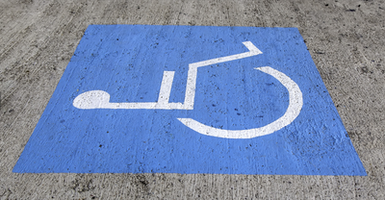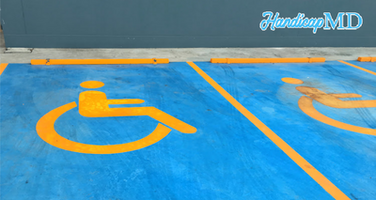
Disabled Parking Permit in Meridian, ID: How to Obtain and Use a Handicap Parking Permit
For individuals with disabilities, accessibility is a cornerstone of independence and mobility. Disability tags, also known as handicapped passes or license plates, are essential tools that make navigating public spaces easier. If you're in Meridian, this comprehensive guide will walk you through the steps of obtaining and using a disability tag, ensuring you’re well-informed about the process, eligibility criteria, and benefits.
What is a Disabled Parking Permit?
A disability tag is an official pass or license plate issued by the state Department of Motor Vehicles (DMV) to individuals with qualifying disabilities. These tags grant access to designated accessible spaces, which are located closer to entrances and equipped with features like wider spaces and adjacent loading zones.
Disability tags come in two primary forms:
- Placards: Temporary or permanent, designed to be hung on the rearview mirror.
- License Plates: Fixed to the vehicle and reserved for individuals with long-term disabilities.
The Importance of Disabled Permits and Their Role in Enhancing Accessibility
Disability tags play a vital role in creating a more equitable environment by addressing the unique challenges faced by individuals with disabilities.
Key Benefits of Disability Tags:
- Improved Mobility: Accessible spaces reduces the physical strain of traveling long distances to building entrances.
- Enhanced Safety: Tags grant access to safer locations, minimizing risks like crossing busy streets or navigating uneven terrain.
- Fostering Independence: Disability tags empower individuals to travel and engage in daily activities without excessive reliance on others.
By facilitating access, disability tags help create a community that values inclusion and equality.
The Benefits of Obtaining a Handicap Permit in Meridian
City residents who obtain a handicap permit enjoy several advantages:
- Convenience: Reserved spaces at shopping centers, medical facilities, and public venues.
- Legal Protections: Disability tags safeguard individuals from fines or penalties when using accessible spaces.
- Recognition Across States: City-issued disability tags are recognized nationwide, ensuring accessibility during interstate travel.
These benefits make life easier for individuals with disabilities and their caregivers, allowing for seamless integration into community activities.
Eligibility Criteria
To qualify for a disability tag in Meridian, individuals must meet specific medical criteria as outlined by the state law. Eligibility generally requires certification from a licensed healthcare provider.
Common Eligibility Requirements:
- Mobility Impairments: Inability to walk 200 feet without rest, use of assistive devices like wheelchairs or walkers, or severe limitations in movement.
- Respiratory Conditions: Dependence on portable oxygen or conditions causing restricted lung function.
- Cardiac Conditions: Severe heart disease classified as Class III or IV by the American Heart Association.
- Visual Impairments: Legal blindness or significant vision loss.
Applicants must submit a completed application form, including a healthcare professional’s certification of their condition.
Common Medical Conditions and Examples
Many medical conditions can qualify an individual for a disability tag. Some examples include:
- Arthritis: Severe arthritis that restricts mobility or requires assistive devices.
- Chronic Pain: Conditions like fibromyalgia or spinal stenosis that significantly limit physical activity.
- Neurological Disorders: Multiple sclerosis, Parkinson’s disease, or other conditions affecting motor skills.
- Amputation or Limb Loss: Partial or total loss of a limb that impacts mobility.
These conditions highlight the diverse needs that disability tags address, ensuring equitable access for individuals with varying disabilities.
Different Types of Disabled Permits Available in Meridian
City residents can choose from several types of disability tags, depending on their needs and circumstances:
- Permanent Tags: Issued for long-term or permanent disabilities, valid for several years and renewable.
- Temporary Tags: Designed for short-term conditions, such as post-surgical recovery, typically valid for up to six months.
- Disability License Plates: Assigned to vehicles owned by individuals with disabilities, providing the same benefits as tags.
- Disabled Veteran Plates: Reserved for veterans with service-connected disabilities, offering recognition and accessibility benefits.
Each type of tag requires specific documentation and is issued through the state DMV.
Step-by-Step Application Process for a Disabled Parking Permit in Meridian
Applying for a handicap placard in Meridian is a simple process that requires a few steps to ensure eligibility and proper documentation. Here’s how to navigate the application process:
- Download the Application for Disability Plates and Placards (Form ITD 3392) from the state Transportation Department (ITD) website or visit your local DMV office to request a physical copy.
Complete the Personal Information Section:
- Fill out the required fields, including your name, address, and contact information. If applying for a license plate, include your vehicle details.
- Have a licensed healthcare provider complete the medical certification section of the form. This step verifies your eligibility based on the state's criteria for disability tags.
Submit the Application:
- Submit the completed application to your nearest DMV office in person or mail it to the state DMV address provided on the form.
Receive Your Tag:
- Once your application is processed and approved, you will receive your disability tag or license plate.
Benefits of Using HandicapMD.com for Online Applications
HandicapMD.com is a trusted resource designed to take the hassle out of applying for disability tags. Here are the key benefits of using this platform:
- Convenience: With HandicapMD.com, you can complete the entire process from the comfort of your home, avoiding the need for in-person visits to government offices.
- Time-Saving: The platform eliminates long wait times by allowing users to submit their application, upload documents, and check statuses online.
- Error Reduction: The system provides step-by-step instructions, ensuring applicants avoid common errors that can lead to delays or rejections.
- Comprehensive Support: If you encounter issues, HandicapMD.com offers responsive customer service to guide you through the process.
- Accessibility: Designed with user-friendly features, the platform is intuitive and inclusive, making it easier for individuals of all tech proficiency levels.
By leveraging HandicapMD.com, city residents gain access to a modern, efficient solution tailored to their needs.
Walkthrough of the HandicapMD.com Application Process
Applying for disability tags through HandicapMD.com is straightforward. Follow these simple steps to complete your application:
Create an Account: Start by registering on the website with basic personal information. This ensures your details are securely stored and accessible for future reference.
Upload Necessary Documentation: Gather the required documents, such as proof of disability from a licensed medical provider and identification. The platform allows you to upload scanned copies directly.
Complete the Online Form: Fill out the online application with details about your disability and vehicle. The form includes easy-to-understand prompts and dropdown menus to simplify the process.
Submit for Review: Once you’ve completed the form and uploaded all documents, submit your application. HandicapMD.com will review your submission for accuracy and compliance.
Track Your Application: After submission, you can log into your account to track the status of your application. Notifications will alert you to any required updates or when your tag is approved.
Receive Your Tags: Upon approval, your disability tags will be processed and sent to you, completing the process without any need for in-person visits.
Why Applying Online is the Best Option
Applying online through HandicapMD.com offers several advantages compared to traditional methods:
- Eliminates In-Person Barriers: Avoiding trips to government offices is especially valuable for those with mobility challenges or demanding schedules.
- Reduces Stress: The online process minimizes paperwork and streamlines communication, making it less overwhelming.
- Speeds Up Approval Times: Digital applications are typically processed faster than physical ones, allowing you to receive your disability tags sooner.
- Eco-Friendly: Online applications reduce the need for printed forms, contributing to environmental sustainability.
- Available 24/7: You can work on your application at any time that suits your schedule, offering unparalleled flexibility.
City residents embracing this online solution means a faster, more accessible way to secure disability tags, ultimately improving mobility and quality of life.
Fees
City disability tags are affordable, and in many cases, fees are waived for eligible individuals. The costs depend on the type of tag you are applying for:
Permanent Tags:
- Typically issued free of charge.
Temporary Tags:
- A nominal fee, usually $5, may apply.
Disability License Plates:
- Standard vehicle registration fees apply. Additional charges may be waived for those with qualifying disabilities.
Special Disability Veteran Plates:
- These are often exempt from registration fees, though documentation of a service-connected disability may be required.
Check with the state DMV for the most accurate and up-to-date fee schedule.
Validity and Expiration
The validity period for Idaho handicap placards varies depending on the type:
- Permanent Tags: Valid for five years and must be renewed before expiration.
- Temporary Tags: Valid for up to six months or as indicated by the medical certification.
- Disability License Plates: Valid for the standard vehicle registration period (usually one year) and require annual renewal.
Renewal Process
Renewing a disability tag is straightforward, ensuring uninterrupted access to accessible spaces:
Check the Expiration Date:
- Review the expiration date on your tag or license plate to determine when renewal is required.
Complete a Renewal Application:
- For tags, submit a new Form ITD 3392 to the DMV. For plates, follow the standard vehicle registration renewal process.
Medical Recertification:
- Permanent tags usually do not require medical recertification unless requested. Temporary tags will need updated medical documentation.
Submit the Renewal:
- Submit the renewal application and any applicable fees online, by mail, or in person at a DMV office.
Receive Your Updated Tag:
- Once approved, you will receive your renewed tag or license plate.
Replacing Lost, Stolen, or Damaged Handicap Permits in Meridian
If your disability tag is lost, stolen, or damaged, you can request a replacement by following these steps:
Report the Incident:
- For stolen tags, file a report with your local law enforcement agency to document the theft.
Obtain a Replacement Form:
- Download the Application for Disability Plates and Placards (Form ITD 3392) from the ITD website or visit a DMV office.
Complete the Form:
- Indicate the reason for replacement (lost, stolen, or damaged) and provide all required personal and vehicle details.
Submit Supporting Documents:
- Include proof of identity and, if applicable, a copy of the police report.
Pay the Replacement Fee:
- A small fee, typically $5, may apply for replacement tags or plates.
Receive Your Replacement:
- After processing, your replacement tag or license plate will be issued.
How to Display Your Handicap Permit Correctly
Displaying your handicap placard correctly ensures compliance with regulations and avoids unnecessary penalties. Proper display also allows local authorities and law enforcement to identify your vehicle as eligible for accessible spaces.
For Placards:
- Hang the tag from the rearview mirror when parked. Ensure the printed side with the disability symbol and expiration date is visible from the outside.
- Remove the tag while driving to prevent obstructing your view.
For License Plates:
- Affix the disability license plate securely to your vehicle’s rear (and front, if required by the state law).
- Keep a copy of your vehicle registration in the car as proof of valid issuance.
Improper display, such as placing the tag on the dashboard or failing to secure a license plate properly, may result in fines or other enforcement actions.
Using Your Meridian Disabled Permit in Other States
City-issued disability tags are recognized nationwide under the Americans with Disabilities Act (ADA). This means you can use your tag in other states while traveling.
Key Tips for Using Your Tag Out-of-State:
- Check Local Regulations: Some states may have specific rules about how disability tags are displayed or used.
- Follow Local Time Limits: While disability spots is universal, individual states or municipalities may impose time restrictions for these spaces.
- Use Van-Accessible Spaces Only When Needed: If you do not require a van-accessible space, consider leaving it available for those who do.
Always ensure your tag is correctly displayed to avoid confusion or fines in unfamiliar areas.
Penalties for Misusing Accessible Parking Spaces
Accessible spaces are reserved exclusively for individuals with disabilities, ensuring they have convenient and safe access to buildings and services. Misusing these spaces undermines their purpose and can result in significant penalties.
Common Penalties Include:
Fines:
- Unauthorized use of an accessible space in the city can result in fines ranging from $100 to $300, depending on the violation and local enforcement.
Vehicle Towing:
- Vehicles parked illegally in accessible spaces may be towed at the owner’s expense, including towing and storage fees.
Tag Revocation:
- Misuse of a disability tag, such as using one issued to someone else, can lead to revocation and ineligibility for future tags.
These penalties emphasize the importance of respecting disability spot regulations to maintain fairness and accessibility for those who need it.
Common Violations and Their Consequences
Misusing accessible spaces or disability tags often stems from a lack of awareness or intentional disregard for the rules. Common violations include:
Accessing a Disability Space Without a Tag:
- Unauthorized vehicles parked in accessible spaces are subject to fines and towing.
Using Someone Else’s Tag:
- Borrowing a tag issued to a friend or family member is illegal unless the person with the disability is present in the vehicle.
Blocking Access Aisles:
- Staying over striped access aisles, designed for wheelchair lifts and mobility devices, can lead to citations and towing.
Using an Expired Tag:
- Failing to renew a disability tag can result in penalties for improper use.
Consequences for these violations are designed to protect the rights of individuals who genuinely need accessible spaces.
Common Myths and Misunderstandings About Handicap Permits
Disability tags are often misunderstood, leading to myths that perpetuate misuse or stigma. Here are some common misconceptions and the facts:
Myth: Disability Tags Are Only for Wheelchair Users
- Fact: Tags are issued for various conditions, including respiratory or cardiac issues and chronic pain, not just mobility impairments visible to others.
Myth: Temporary Disabilities Don’t Qualify
- Fact: The city offers temporary tags for short-term conditions, such as surgery recovery or injuries that limit mobility.
Myth: Family Members Can Use the Tag Without the Person with Disability Present
- Fact: Disability tags are strictly for the benefit of the individual with the disability. Using the tag without the eligible person present is illegal.
Myth: Tags Allow Parking Anywhere for Free
- Fact: Disability tags grant access to designated spaces but do not exempt users from time limits or fees unless specified.
Myth: Tags Are Easy to Obtain Without a Valid Disability
- Fact: Applications require medical certification from a licensed healthcare provider to verify eligibility, ensuring that tags are issued only to those who meet the criteria.
What is Disabled Parking?
Disabled parking refers to specially designated spaces reserved for individuals with disabilities. These spaces are designed to reduce the physical and logistical barriers that people with disabilities often encounter when accessing buildings, services, and public spaces. Disability spaces ensures a fair and inclusive environment, making it easier for individuals to participate in daily activities and maintain independence.
Features of Designated Parking Spaces
Accessible spaces are carefully designed to meet the needs of individuals with disabilities. Common features include:
- Proximity to Entrances: Spaces are located near building entrances, ramps, or elevators to minimize travel distance.
- Wider Spaces: These spaces provide extra width to accommodate wheelchair lifts, ramps, or mobility aids.
- Access Aisles: Adjacent striped areas are reserved for loading and unloading wheelchairs or other equipment.
- Van-Accessible Spaces: Certain spaces are designed specifically for vehicles with wheelchair lifts, offering extra room and overhead clearance.
- Clear Signage: Signs with the International Symbol of Accessibility clearly indicate the purpose of the space and often display penalties for misuse.
These features ensure accessibility, safety, and convenience for individuals with mobility challenges.
Tips for Using Accessible Parking Responsibly
Using disabled parking spaces comes with a responsibility to respect their purpose and preserve their availability for those who genuinely need them. Here are some tips for responsible use:
- Display Your Tag Correctly: Ensure your disability tag or plate is visible and valid.
- Only Use Accessible Spaces When Needed: If you can park elsewhere, leave the space for someone with greater need.
- Avoid Blocking Access Aisles: These are crucial for wheelchair users to enter and exit vehicles safely.
- Adhere to Time Limits: Some accessible spaces have specific time restrictions. Follow these to ensure turnover for others.
- Educate Others: Share knowledge about the importance of accessible space and encourage responsible behavior.
Encouraging Others to Follow Regulations
Creating a culture of respect for accessible space starts with education and advocacy. Here’s how to encourage others to follow the rules:
- Raise Awareness: Talk about the challenges faced by individuals with disabilities and the importance of accessible spaces.
- Lead by Example: Use your disability tag responsibly and follow city regulations.
- Report Violations: Notify property managers or law enforcement when you see misuse of accessible spaces.
- Support Accessibility Initiatives: Advocate for better enforcement and expanded accessible spaces in your community.
By fostering a shared understanding of the value of these spaces, we can ensure they remain available for those who need them most.
FAQs
1. How do I apply for a disability tag?
Complete the Application for Disability Plates and Placards (Form ITD 3392), have it certified by a licensed healthcare provider, and submit it to your local DMV office.
2. Can I use my disability tag in private lots?
Yes, most private lots honor state-issued disability tags, though enforcement may vary depending on the property owner.
3. What should I do if my tag is lost or stolen?
Report the loss or theft to local law enforcement and apply for a replacement tag at your local DMV office.
4. Do temporary disabilities qualify for a tag?
Yes, the state issues temporary tags for short-term disabilities, such as surgery recovery or temporary injuries, usually valid for up to six months.
5. Can someone else use my disability tag?
No, the tag is strictly for the benefit of the individual it is issued to. Misuse can result in fines and revocation of the tag.
Conclusion
Accessible spots plays a critical role in promoting accessibility and inclusivity for individuals with disabilities in Meridian, ID. Understanding the features, proper use, and regulations surrounding disability tags helps ensure that these spaces remain available for those who need them. By respecting the rules and encouraging others to do the same, we contribute to a community that values fairness and equal access.
If you or someone you know qualifies for a disability tag, start the application process today through HandicapMD.com. Their expert guidance makes it easy to navigate the requirements and secure the accessible parking benefits you deserve. Don’t let barriers hold you back—apply now and take the first step toward greater independence and mobility!
.png)






